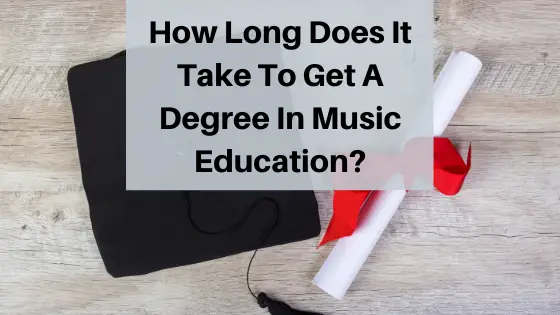Are you considering getting a degree in music education?
Would you like to switch career paths to the rewarding music teaching path?
Teaching music at any level is one of the most rewarding paths you can take, but it does take a little time and work.
So you may want to know how long does it take to get a degree in music education?
On average, it takes between 4-5 years of study of an undergraduate program at a university. Music education schooling requirements often consist of:
- Piano classes
- Classes on families of instruments
- Music Theory
- Music History
- Sight-singing and ear training
- Lessons for instrument/voice
- Ensemble (band, orchestra, choir, jazz band)
- Pedagogy classes
- Conducting classes
- Recitals
- Student Teaching
- More depending on the program
The breakdown consists of more information on each aspect of a music education degree.
Table of Contents
Breakdown
In this section, we’ll look at each of the requirements and describe what you may need to do as part of your degree depending on the school. We’ll also briefly explain why these courses are common requirements.
If these courses interest you, take a look at the next section for some quick tips at getting through the audition process. Yes, almost all programs require you to audition and declare an instrument or voice as your main one for the duration of your schooling.
Related Reading: Elementary Music Teacher Salary
Credit Requirements
Undergraduate degrees in Music Education will require a lot of coursework. The main reason for this is the larger number of low credit classes.
In other programs, there are very few of the courses required which have less than 3 credits. But in music, “smaller” classes such as ensembles, lessons, and concert attendance will be less than that (or even zero).
On top of this, you’ll be expected to attend studio times, extra rehearsals, and other things outside your normal coursework.
The average amount of credits required for Music Education Bachelor’s degree is 133. This information is based on the requirements from the top 10 music education schools according to Music School Central.
Here are the schools in an easy-to-read table.
| University | Number Of Credits Required At Minimum* |
| University of Wisconsin | 154 |
| SUNY Fredonia | 120 |
| Eastman School of Music | 146-147 |
| University of Michigan | 130 |
| Teachers College at Columbia University** | 40 for Masters |
| Westminster Choir College of Rider University | 131 |
| SUNY Potsdam’s Crane School of Music | 124.5 |
| Ithaca College School of Music | 124.5 |
| Indiana University Jacobs School of Music | 120 |
| Northwestern University Bienen School of Music | 145.5 |
*This is without general liberal arts classes included (i.e. English 101, Math 107, etc).
**This program only offers graduate degrees. They are exempted from the average.
Piano classes
One of the courses you’ll have to take is a group or private piano lessons. The piano is known as one of the most versatile instruments you could play.
Learning piano helps you develop a better ear, coordination, and understanding of music theory. All music teachers can use the piano to some extent.
Elementary teachers can play piano for their students, choir directors can use it to help voice out melody lines and chords, band, and orchestra directors can use it to demonstrate complicated sections in the music.
The amount of piano you need to take varies on school with the average being 1-2 of a weekly piano class.
Classes on families of instruments
All music education degrees will include some courses meant as an introduction to teaching the instruments you may teach in your career. Often, these classes are separated by instrument family.
Often, the classes are separated like this:
- Brass (sometimes split into high and low)
- Woodwind
- Double Reed
- Percussion
- String
- Vocal
- Classroom Instruments
The format changes depending on the specific school and professor.
One format has you focus on one or two instruments in a family the whole semester. The idea is that you gain more competence with one and transfer the skills across the others.
The other has you switch between all the instruments in the family in one semester. You get a shorter experience, but you at least have some with each instrument.
Music Theory
Music theory is the study of how music is written and put together. It often involves the analysis of chords, form, and instrumentation.
Music theory is one of the most loved or hated classes. Depending on the program, your theory classes will cover different topics. Often, undergraduate theory classes will spend two years getting from the Baroque period to the Romantic periods.
Music History
Music history is closely tied to music theory. History classes will cover many of the same topics with more focus on the who, what, and when of the music.
As normal, the length and coverage of the history classes depend on the program, but you can expect to take 2-3 courses on music history with at least one lengthy history research paper and possible presentation.
Sight-singing and ear training
Ah, the class that everyone loves to hate. In sight singing and ear training classes (sometimes called dictation), you’ll be developing your ear and working on notating increasing complex, rhythms, melodies, and chord progressions.
Many music majors will joke that this is the music class guaranteed to tank your perfect GPA, and they’re sort of right. These classes are difficult (I managed to do OK, but I wasn’t great by any means).
However, you cannot underestimate the importance of a good ear. It’s so important that even some training like Kodaly includes it in their coursework beyond undergrad.
Lessons for instrument/voice
During your time, you’ll have to have a “major” instrument or voice. You’ll be expected to take weekly lessons and attend weekly (or more) studio times when you play with others in your area or listen and critique each other.
Ensemble (band, orchestra, choir, jazz band)
Obviously, music isn’t just about you. You’ll also be expected to enroll and perform with bands of various groups. Often these groups are by audition and will perform at a much higher level than high school or community groups.
Pedagogy classes
Pedagogy classes are special technique classes in your specific area. For example, a band-focused person may end up taking courses called “Band Method” or “Marching Band Fundamentals.”
A future choral director may take “Vocal Pedagogy” or “Choral Literature.”
Conducting classes
All music education degrees regardless of their focus (including elementary) will need to take conducting classes. Often, these will also involve some pedagogy, but the focus is on improving your ability to communicate with your movement how you want students to perform.
Recitals
Some programs require a certain level of performance for music education students. These can take the form of solo recitals. Make sure you know what your specific program requires.
Student Teaching
All education degrees will require some form of student teaching or internship. The length and type are dependent on the program and the professor.
Student teaching may be waived in some states under special circumstances such as the student already being a staff member working students in classrooms. Check your specific state laws for more information.
Conclusion
I hope you found this information on how long it takes to get a degree in music education helpful. 4-5 years is a big commitment with a lot of work, but at the end of it, you get to make a difference in the lives of your students forever.
Did the answer surprise you? Let us know in the comments.

